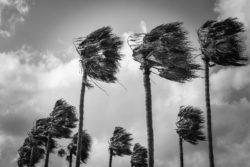 Hurricane Update:
Hurricane Update:
As you may or may not know, I live about 20 miles south of Tampa, FL. Ian was supposed to hit us directly. I do not live in a flood evacuation zone, but no one could talk about anything except the hurricane last weekend, so I had to take my head out of the sand regarding my first Florida hurricane. I made necessary preparations in case of loss of power and water: filling bathtubs and wastebaskets with water, getting water to drink, having enough flashlights and extra phone chargers, etc. I do not, however, have hurricane shutters for my house. My daughter and son-in-law live three miles down the road, and they do have shutters (although there was a fiasco in the neighborhood with putting them up. They came with the fairly new houses, but people were given the size that belonged to other people in the neighborhood. It got straightened out in time.)
We were very lucky. The hurricane decided to change course a bit and came onto land about 120 miles south of us. Fort Myers, not expecting to be hit hard, was devastated. Tampa, predicted to get 10 or 20 inches of rain, probably didn’t even get five. There was no storm surge in Tampa Bay, and as a matter of fact, the wind sucked the water out of the bay.
However, it was still a major storm even here. And it went on to unexpectedly wreak havoc on Orlando and Kissimmee, inland. Now it is on its way up to the Carolinas, so everyone involved, stay safe. Even 20 miles south of us, houses had major damage. My daughter’s house and my house suffered no damage. Their fence is still up. My tree did not fall into my house, although it lost some small branches. However, both our neighborhoods had many trees down and are kind of a mess.
But we are grateful.
*********************************************************
I am pleased to present a guest post by Amber Ramsey.
Amber is a career woman. She’s fierce, confident, and has the “can do” attitude we all strive for. Like most of us, she started out in the corporate world, but she found that her fire, spirit, and creativity were better suited to the entrepreneurial lifestyle. Amber has been on both sides of the desk, as an employee and the boss, so she has plenty of career advice to share.
How to Become a Freelance Writer as a Student or Recent Grad

Freelance writing offers ample flexibility, making it a perfect career for students and those who have to manage their time wisely. As a freelancer, you can choose when and how much work you take on, making it easier to earn more when you have a lighter course load.
Train Wisely
Many free and low-cost online training programs are available for aspiring freelancers, and social media accounts and YoutTube channels are filled with tips. There’s no need to spend a fortune getting ready to write. If you choose to work as an independent contractor for a content company, they often will include training so you can get paid while you learn. Seek out blogs and tips from other writers for more free information.
It’s also a good idea to polish your grammar, both when starting out and as an ongoing discipline. ( You can always reach out to Arlene Miller, The Grammar Diva.)
Create Writing Samples
Along with a resume that lists your skills and experience, you will want to gather or prepare writing samples for potential employers or clients to see. If you don’t have any samples ready, you can write some that relate to topics you are interested in or topics that content writers are frequently hired to write about for blogs. You may also want to familiarize yourself with writing search engine optimization content and show your skills in that area.
Find Jobs
There are a few different ways to enter the freelance market. Job sites like FlexJobs, Fiverr, and UpWork allow you to find content-writing jobs that are already listed or to list yourself as a freelancer for others to seek out. These sites can also connect you with companies looking for part-time writers and have positions with a significant amount of flexibility.
On sites like Fiverr, where clients can hire you directly, it’s essential that you get good reviews. A great way to do this when starting out is by offering your services at a low price so that you attract more clients and garner great reviews quickly. Like everything else on the internet, you want to make sure you hack the algorithm and come up at the top of search results.
Organize Your Time
It can be easy to get overwhelmed when you’re juggling school, work, social activities, and other hobbies. Before you start freelancing, you will want to make sure you have a system in place to stay on top of everything. Try using a task manager like Trello or Evernote to get everything organized. Both of these programs allow you to keep track of due dates and offer other premium features that keep you on track. Eastern Washington University suggests making sure that you assess what a reasonable amount of work to take on is so that you can prevent burnout.
Get Your Paperwork Ready
You will want to create a business entity so that you can properly file your taxes with a tax ID number (EIN). An EIN will be unique to your business and help the IRS track your payroll taxes. It will make filing your federal and state taxes easier as well.
The tips above should have you on your way to starting your new career. Thankfully, with the content job market growing, ample opportunities are available for talented writers. As always, persistence and enthusiasm will help set you apart from the pack.
*********
IN OTHER NEWS:
Last week I had a lovely Zoom session with Robert Brandwayn, a language coach, musician, and artist from Bogota, Columbia. Our conversation will be on YouTube and his podcast when it is edited. I will provide links at that time.
I am proud to say that The Best Grammar Workbook Ever was the #1 book in the Adult and Continuing Education category on Amazon for several days in September. Thank you all for your support.



Your blog give inspiration to me of how to write better. Thanks.
You are welcome. Thanks for the comment!
Glad to hear you are safe – I was thinking about you!
Thanks, Carol! We are lucky!
I’m glad that you, your daughter and son-in-law survived Hurricane Ian unscathed. Horrible to see the devastation that befell people further south on the Gulf Coast. The worst I ever saw, as a child in the Miami area in the 1960s, was a Category 1 hurricane.
On the topic of grammar, however, it saddens me to see a grammar advisor using a slash, especially in a title. “Becoming a Freelance Writer/Hurricane Update and More”. Why make readers work? I assume you mean “Becoming a Freelance Writer, a Hurricane Update, and More”. English is not German; don’t fear spaces!
Is that a “rule”? I don’t see why that makes readers work. I don’t fear spaces–or series
Not a “rule” (which is part of the problem: many style and punctuation guides ignore it).
Hence many writers use the slash to replace “and” or “or”, or a comma, or a hyphen (hunter-gatherer has now become “hunter/gatherer” for many writers). Even worse, many throw in similar words separated by a slash to indicate, “I’m not sure which word (or phrase) is the best here, so I’m pushing it onto you, reader. You can decide for yourself.” (Gee, thanks.)
So knowing that, a slash DOES create extra work for me, as I have to pause and think, “OK, what is the slash standing in for this time?” And then I have to decide, is it a break, a mark indicating alternatives (in which case starting where and ending where), or a series? “Becoming a Freelance Writer, a Hurricane Update, and More” or “Becoming a Freelance Writer — a Hurricane Update — and More” or even “Becoming a Freelance Writer | a Hurricane Update | and More” takes less time for my brain to process.
The explosion of the slash as a universal conjunction and punctuation substitute only started to happen around 1990. For centuries before that, writers somehow got by without using it except for dates, fractions, showing where lines from poems break (always surrounded by spaces), and eventually URL code. A good example is Charles C. Mann’s history books on the Americas. His first, “1491”, was published in 2005 and is free of slashes. His second, “1493”, was published in 2011 and is riddled with slashes — on average at least one every other page — and in my view is less tightly written.
I understand you may disagree.
I do not disagree. However, I do not use a slash in text for the examples you gave. I rarely uses sashes at all. However, in this title I thought it made things clearer.